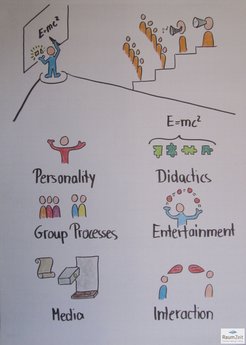Teaching
Teaching is very often an essential part of a career in research. If we remember our times as students, there are teachers who fascinate their students even with a dull topic, and there are others who seem to require a cushion for resting one’s head on during the lecture. Seen from the perspective of the teacher himself, there are easy-going groups of students with whom it is fun to work, and others which make it really hard to get oneself motivated to enter the classroom. However, if we look back at those brilliant lecturers, we will observe that teaching can be a lot of fun even with difficult groups and dull topics. But how do we achieve this?
Contents and Objectives

In this workshop we will look behind the different ingredients of successful lecturing. The most important is your personality as a teacher. In many smaller exercises we will work on your style of presenting and your standing in front of the group (video feedback possible if allowed for a third day). Second, the right didactics is a key factor to successful learning on part of the students. For this we will look into state-of-the-art education approaches. Part of your standing is to be able to handle difficult students also. For this we will look at group processes and some tricks from the trainer’s practical experience. For catching and maintaining the attention of your students we will involve the lecture room, metaphors and story telling as “entertainment”. With it goes the right mix of media. Finally, for a successful learning experience, the students will need interaction. Here we will look at different formats which can be easily implemented in the lecture or as supplementary exercises. When to use what is again part of the didactics.
Results to take home
At the end of the training you will have theoretical knowledge on teaching as well as practical experience with your worst group of students ever, your colleagues. Your lecture has been reworked and you can use it as an example for other lectures which you need to prepare. All contents of this training can also be used in other situations such as moderating meetings and giving presentations on conferences.
Trainer
Dr. Sabine Preusse studied Geophysics and obtained her PhD on extrasolar planets in 2005. Until 2011 she worked as a project manager and consultant for European funded research projects at the Steinbeis-Europa-Zentrum. Though having slept in many lectures, Sabine rediscovered her passion for training and teaching in a project offering soft skill trainings for young researchers in 2006. She has put this on a professional basis by obtaining a certificate as a business trainer by the BDVT in 2009 and founding her own company RaumZeit e.K. in 2011. For her teaching and learning is something very serious and it is definitely aloud to be fun.
